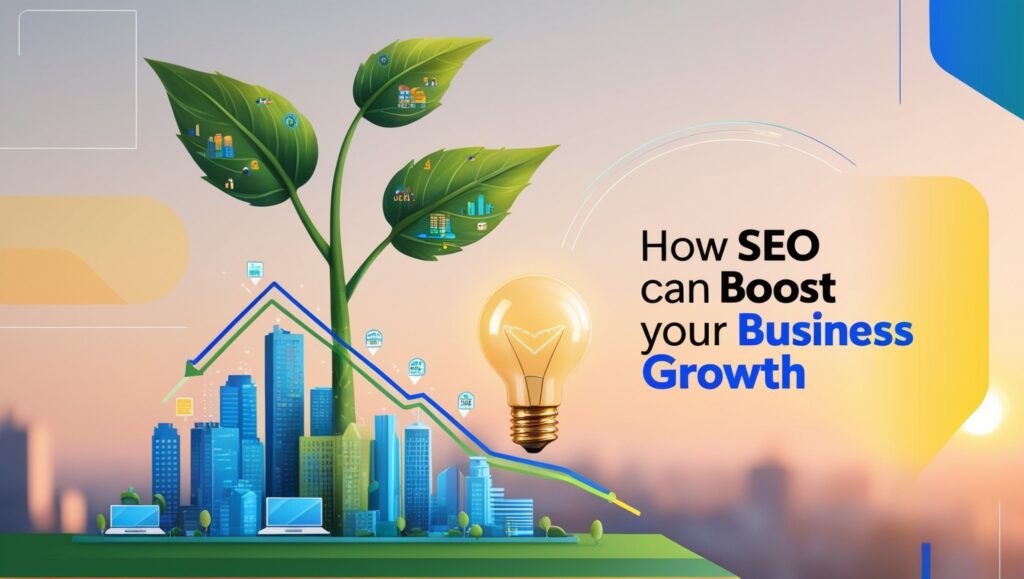In today’s competitive digital landscape, a strong online presence is essential for business success. Search Engine Optimization (SEO) is one of the most powerful tools available to help businesses attract organic traffic, improve visibility, and ultimately grow. Whether you’re running a small business or a large enterprise, SEO can play a pivotal role in boosting growth by driving more potential customers to your website.
In this article, we will explore what SEO is, why it is essential for business growth, and how you can use SEO to expand your business. We’ll also cover SEO strategies you can implement and provide tips on achieving long-term success.
What is SEO?
Search Engine Optimization (SEO) is the process of optimizing a website and its content to rank higher in search engine results pages (SERPs). SEO involves making strategic adjustments to your website’s design, content, and technical structure so that search engines like Google can better understand and rank it.
SEO can be divided into three main categories:
- On-page SEO: This focuses on optimizing individual web pages, including using keywords, optimizing meta tags, improving readability, and creating quality content.
- Off-page SEO: This refers to actions taken outside of your website to improve its ranking, such as building backlinks, social media marketing, and guest blogging.
- Technical SEO: This ensures that search engines can crawl and index your website efficiently. It involves improving page load speed, mobile optimization, website architecture, and fixing crawl errors.
How SEO Works
Search engines use complex algorithms to determine which websites should appear at the top of the search results for a particular query. These algorithms consider factors such as:
- Relevance: How well your content matches the user’s search intent.
- Authority: How trustworthy and credible your website is, based on the number and quality of backlinks from other reputable sites.
- User Experience: This includes factors like site speed, mobile-friendliness, and ease of navigation.
By optimizing your website for SEO, you can ensure it meets these criteria, improving your chances of ranking higher on search engines, which directly impacts your business growth.
Why SEO is Essential for Business Growth
In the digital age, consumers primarily rely on search engines to find products, services, and information. If your business doesn’t rank on the first page of search results, it’s unlikely that potential customers will find you. SEO helps bridge this gap by improving your visibility in search results.
Here’s how SEO directly impacts business growth:
1. Increases Website Traffic
One of the primary goals of SEO is to improve your website’s ranking in search engines. When you rank higher, especially on the first page of Google, you get more organic traffic (visitors from search engines without paying for ads). Organic traffic is crucial because it brings potential customers who are actively searching for what your business offers.
- Fact: Over 70% of clicks go to the top five results on Google. If you’re not ranking in these spots, you’re missing out on significant traffic.
By targeting relevant keywords and optimizing your content, you can bring in a steady flow of organic visitors, increasing the chances of conversions and sales.
2. Builds Credibility and Trust
When people see your website consistently appearing at the top of search results, it builds credibility and trust. Users tend to trust search engines to deliver the most relevant and reputable sites, so if your site is ranked highly, users perceive your business as authoritative and trustworthy.
SEO also enhances your site’s user experience by ensuring fast load times, mobile-friendliness, and high-quality content. A positive user experience leads to higher engagement and trust, which translates to long-term customer relationships.
3. Drives Targeted Leads
One of the key benefits of SEO is that it drives targeted traffic to your site. SEO allows you to target users who are actively looking for products, services, or information related to your business. By using the right keywords and optimizing your content for search intent, you attract visitors who are more likely to convert into customers.
For example:
- A local bakery could use SEO to rank for terms like “best bakery in [city name]” or “custom cakes in [city name].”
- An e-commerce business could target product-specific searches, such as “best running shoes for beginners.”
SEO ensures that the traffic coming to your site is relevant, meaning it consists of potential customers who are more likely to engage with your business.
4. Provides Long-Term Results
Unlike paid advertising, where traffic drops as soon as you stop paying for ads, SEO provides long-term results. Once you’ve optimized your website and built a solid SEO foundation, you can continue to generate organic traffic over time without ongoing costs.
This makes SEO a cost-effective marketing strategy for businesses looking to grow in the long run. While SEO does require consistent effort and updates, the return on investment (ROI) is typically higher than many other marketing channels.
SEO Strategies to Boost Your Business Growth
To fully leverage the benefits of SEO for business growth, you need to implement effective strategies. Below are some key SEO strategies to consider:
1. Conduct Comprehensive Keyword Research
Keyword research is the foundation of any successful SEO strategy. It involves identifying the search terms and phrases your target audience is using when searching for products, services, or information related to your business.
Steps to Conduct Keyword Research:
- Use Keyword Tools: Tools like Google Keyword Planner, Ahrefs, and SEMrush can help you discover relevant keywords with good search volume and low competition.
- Focus on Long-Tail Keywords: These are more specific phrases, such as “best Italian restaurant in New York” rather than just “Italian restaurant.” Long-tail keywords tend to have less competition and higher conversion rates.
- Analyze Competitor Keywords: Look at the keywords your competitors are ranking for to identify opportunities for your business.
Once you have a list of target keywords, you can optimize your website’s content and meta tags to rank for those terms.
2. Optimize On-Page SEO
On-page SEO refers to optimizing individual web pages to rank higher in search results. This includes optimizing your content, HTML tags, images, and URLs to improve your website’s relevance to search queries.
Key On-Page SEO Tactics:
- Title Tags and Meta Descriptions: Include your target keyword in the title tag and meta description to improve click-through rates (CTR).
- Content Optimization: Create high-quality, informative, and engaging content that answers your audience’s questions. Use your target keywords naturally throughout the content, including in headings and subheadings.
- Internal Linking: Link to other relevant pages on your site to help users navigate and keep them on your site longer, which can improve rankings.
3. Focus on Technical SEO
Technical SEO ensures that search engines can crawl, index, and rank your website efficiently. A technically optimized site enhances user experience and ensures that there are no barriers preventing your site from ranking higher.
Key Technical SEO Elements:
- Mobile Optimization: With Google’s mobile-first indexing, having a mobile-friendly website is critical. Make sure your site adapts to different screen sizes and performs well on mobile devices.
- Page Speed: Fast load times are essential for both user experience and rankings. Use tools like Google PageSpeed Insights to monitor and improve your site’s speed.
- SSL Certificate: Secure websites (those with “https”) are given preference in search rankings. Ensure your website has an SSL certificate for security.
4. Build High-Quality Backlinks
Backlinks, or links from other reputable websites to your site, are one of the most important factors in SEO. Backlinks act as “votes of confidence” for your website, signaling to search engines that your content is valuable and authoritative.
How to Build Backlinks:
- Guest Blogging: Write guest posts for other reputable websites in your industry and include a link back to your site.
- Create Shareable Content: Infographics, original research, and comprehensive guides are more likely to be shared and linked to by other sites.
- Outreach: Reach out to bloggers, journalists, and influencers in your industry and ask them to link to your content if they find it valuable.
The more high-quality backlinks you have, the more authoritative your site appears to search engines, improving your chances of ranking higher.
5. Leverage Local SEO
If your business serves a local market, local SEO is essential for attracting nearby customers. Local SEO involves optimizing your online presence to rank for local search terms and ensuring your business appears in Google’s Local Pack.
Local SEO Tactics:
- Google My Business: Create and optimize a Google My Business profile, ensuring all information is accurate and up-to-date.
- Local Keywords: Use local keywords in your content, such as “SEO services in [city name].”
- Local Citations: Ensure your business is listed on online directories like Yelp, Yellow Pages, and local chamber of commerce sites.
Measuring SEO Success
To ensure your SEO efforts are driving business growth, it’s essential to track and measure your success. Here are some key metrics to monitor:
1. Organic Traffic
Use Google Analytics to track how much traffic your website is receiving from organic search. Increasing organic traffic over time is a sign that your SEO strategy is working.
2. Keyword Rankings
Track the performance of your target keywords using tools like Ahrefs
improve rankings for underperforming keywords.
3. Conversion Rates
Ultimately, the goal of SEO is to drive conversions. Monitor your conversion rates to see how many visitors are completing desired actions (purchases, sign-ups, etc.) as a result of organic traffic.
4. Bounce Rate and Time on Site
Analyze how users are interacting with your site. A high bounce rate or low time spent on the site may indicate that your content isn’t meeting users’ needs.
Conclusion
In conclusion, SEO is an essential tool for businesses looking to boost their growth in the digital landscape. By increasing visibility, driving targeted traffic, and building credibility, SEO can lead to significant long-term benefits.
Implementing effective SEO strategies, such as keyword research, on-page optimization, technical SEO, backlink building, and local SEO, will help you create a strong online presence and attract more potential customers. Remember to continuously measure your success and adapt your strategies to stay ahead of the competition.
Investing in SEO is investing in your business’s future. Start implementing these strategies today, and watch your business grow as you attract more customers and increase your online presence.
For expert assistance in enhancing your online visibility and driving growth through SEO, feel free to contact us at webdevnseo.com.


